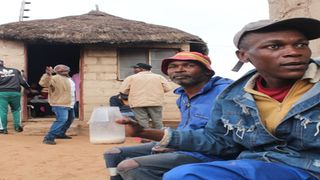
Revellers drink South Africa's traditional beer umqombothi .
| Peter Dube | Nation Media GroupAfrica
Premium
Why South Africa's traditional beer umqombothi has stood the test of time
It is Thursday and Sindisiwe Mathebula (56) of Zondi, Soweto in Johannesburg has been preparing 40 litres of the local brew in four 10-litre buckets containing the beer.
Her niece from another Soweto suburb of Jabulani is getting married at the weekend and traditional beer will be served at the ceremony.
She has been brewing beer for many years, having learnt the craft from her grandmother when she was just a teenager.
“It is day two now since I made it and by Saturday, it will have matured and ready for consumption,” she says of the brew made from sorghum.

A customer is served traditional beer umqombothi in South Africa.
“The sad thing is that only a few people will attend the marriage ceremony due to (Covid-19) lockdown regulations, but we will give some of the beer to our in-laws to share with others when they return home,” Mrs Mathebula says.
Weddings
For people like her, ceremonies such as weddings, anniversaries, birthdays or funerals do not pass without a share of umqombothi. It defines who they are, she told the Nation. Africa.
“By sharing, especially with our in-laws, we are sending a message that their son will be in safe hands and he will always be enjoying good stuff made by our hands. I have no doubt 40 litres is more than enough,” she added.
Fermented cereals
Across Africa local brews have been made from local cereals. In Ethiopia, they have Tella, a brew made from either maize or barley and a local herb called Gesho, and another beer called Tej which is made from honey. Both are mostly served at weddings.
In Kenya and Uganda, they have Enguli/Chang’aa, the spirit distilled from fermented maize, sorghum or millet. They also have busaa, the sort of traditional beer which results from fermented cereals.
In the coastal regions of Kenya and Tanzania, they have mnazi, a brew from coconut water. These illicit brews have stuck around for being cheap and more potent.
In South Africa, umqombothi has survived because the government endorses it. The recent ban on alcohol sale did not include the brew and the joke in town is folks addicted to the bottle were ‘passing days’ on umqombothi.
Prominent South African musician Yvonne Chaka Chaka sang about the beer in her 1988 hit. This dark-coloured beer has maize malt, sorghum malt and brewer’s yeast as the main ingredients which are mixed with boiled water.
Home-brewed umqombothi is popular especially in rural areas and is consumed at traditional ceremonies, funerals and at social gatherings.
The alcohol that has been historically brewed in South Africa for centuries before the introduction of clear beer.

Revellers enjoy South African traditional beer umqombothi.
Traditionally served in a calabash, it is also connected with some divine intervention as it is commonly used during traditional prayers.
Opaque beer
The mass production of lagers, whiskey, gin, and brandy have, however, seen people slowly quit the consumption of the opaque beer, especially urbanites and the young generation, according to research by Slow Food International, an organisation that promotes local food cultures
But people like Mrs Mathebula are still proud and brag about traditional liquor.
“As you can see I have placed these buckets here on the sun since we are in winter and it needs warmer temperature to achieve an intense flavour,” says Mrs Mathebula.
“In the next three days, I will be sieving the foam while adding a bit of sorghum. But I shouldn’t overdo it because the alcohol content will be too strong for our guests and everyone else who will take this. I don’t want our in-laws to get too drunk,” she added.
Even though she admits that she cannot tell the exact alcohol volume in percentage in the brew, she brags of being an expert in brewing beer which is not harmful. She estimates that the alcohol volume could be between 3 to 5 per cent.
Mrs Mathebula jokes that her quality control is better than established breweries.
Chibuku and Eyethu brands are the major commercially produced versions of the opaque beer in South Africa whose target market is low-income earners.
Traditional beer
During stricter lockdowns where the sale of alcohol was banned, most people turned to homemade beer.
While it is slowly losing popularity in urban areas, restrictions on alcohol sales made umqombothi more popular than some expensive brands.
Trading in the traditional brew became a thriving business as a two-litre bottle would cost up to $3 (rands).
With law enforcement agents making some breakthroughs in confiscating the alcohol, national police spokesperson Brigadier Vishnu Naidoo admitted that it was difficult to bust those involved in its trade.
Community intelligence
“This is regulated by the Liquor Act and when the police receive information, they act on it. As you may agree that it is difficult to know when people are brewing such in their own homes, especially if it is for personal consumption,” Brig Naidoo said.
Spokesperson for the Limpopo department of transport and community safety Matome Moremi-Taueatsoala also echoed Brig Naidoo’s sentiments.
“It makes it difficult for police to do their jobs, but with community intelligence, we were able to get tip-offs and confiscate home-brewed beer,” Mr Moremi-Taueatsoala said.
Making traditional alcohol for private consumption is permitted by law but there has been backyard brewing where some extra ingredients like ethanol and hand sanitisers are added to come up with some lethal brews.
Some of the illicit traditional alcohol is packaged and sold in taverns.
Mrs Mathebula’s neighbour Khabane Molefe who admires her friend’s brew chips in, “My late uncle in Tembisa used to be in that trade of selling illicit beer.”
Painful death
“He also took that beer, just a small cup would knock one down. I remember him being arrested by the police a couple of times but he continued selling it. He made a living from selling this kind of beer,” she added.
“But he experienced a painful death because he would cough some particles of his liver.”
A few upmarket restaurants still sell sorghum beer in what is left to make it popular among the elites. An annual traditional brewing competition called Umqombothi Brew Contest saw Ms Sibusiso Skhosana from Tembisa, beat nine other female finalists in May.
The competition is hosted by Brewsters Craft, an all-female-owned brewer which aims to maintain the traditional roots of sorghum beer in South Africa’s culture and heritage.
“The idea to start this event came to me in 2017after reading an article in which umqombothi was part of a list of soon to be extinct food products,” founder of Brewsters Craft Apiwe Nxusani-Mawela told Food For Mzansi recently.





